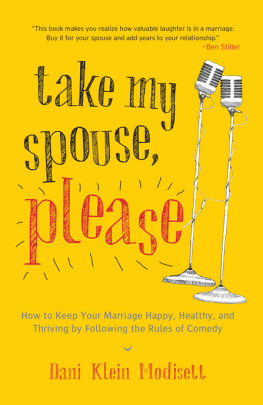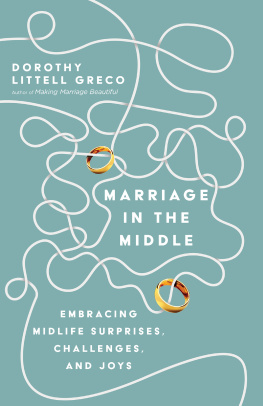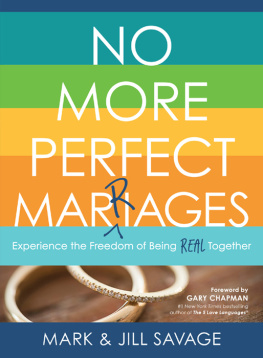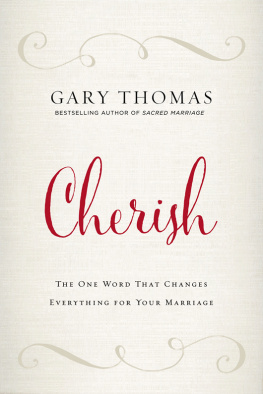The Good Enough Spouse
The Good Enough Spouse
Resolve or Dissolve Conflicted Marriages
By Dr. William E. Ward
New Horizon Press
Far Hills, New Jersey
Copyright 2011 by Dr. William E. Ward
All rights reserved. No portion of this book may be reproduced or transmitted in any form whatsoever, including electronic, mechanical or any information storage or retrieval system, except as may be expressly permitted in the 1976 Copyright Act or in writing from the publisher. Requests for permission should be addressed to:
New Horizon Press
P.O. Box 669
Far Hills, NJ 07931
Ward, Dr. William E.
The Good Enough Spouse: Resolve or Dissolve Conflicted Marriages
Cover design: Robert Aulicino
Interior design: Susan Sanderson
Library of Congress Control Number: 2011922559
ISBN-13 (eBook): 978-0-88282-417-8
New Horizon Press
Manufactured in the U.S.A.
1514131211 12345
Dedication
To my children, whom I cherish:
Billy, Sean, Jacque and Brooke
Authors Note
This book is based on the authors research, personal experiences and clients real life experiences. In order to protect privacy, names have been changed and identifying characteristics have been altered except for contributing experts. The basic dynamics of individuals behavior and marital experiences have not been distorted. The illustrations are examples of the common areas that couples struggle and deal with on a regular basis.
For purposes of simplifying usage, the pronouns he/she and him/her are sometimes used interchangeably. The information contained herein is not meant to be a substitute for professional evaluation and therapy with mental health professionals.
Contents
Is Your Marriage in Trouble?
Most couples walk into divorce court without a clue about why their marriages are about to end. Some spouses are even heard to say, You know, this didnt have to happen. We could have worked it out. Others remain angry, but they are reacting more to the emotional and mental consequences of divorce, still unaware of what led to such results. Couples, sometimes even marriage counselors, rarely discuss or have the ability to delve into the real reasons for the failure of so many marriages. Some explanation is often given for the divorce occurring but very few partners spend the time to get to the core of a marriages demise.
The announcement of a pending divorce is especially surprising in long-term marriages. It is presumed couples married for twenty-five or thirty years or more have successfully passed through the rough stages and therefore their unions will last a lifetime. Yet, such is not the case in the last few decades. The divorce experience is affecting long-term marriages in greater numbers than ever before. The United States Census Bureau estimates that of the 50 percent of marriages ending in divorce, It may come as a surprise that a friend, a relative or a celebrity is divorcing after many years, but outsiders do not know what is going on in another persons marriage. Two people deciding to divorce were most likely ignoring or simply putting up with the slow erosion of their relationship.
Whether it is a divorce in the early stages or after years of marriage, I believe the underlying problem remains the same. Most couples do not know how to identify their real issues, nor do they have the knowledge to resolve these issues before they become a major infection. Couples go through endless and repetitive conflicts without ever getting to the heart of why they occur in the first place. Once each partner learns to examine the relationship in greater depth, the repetitive nature of these conflicts is especially recognizable in long-term marriages. There is always a consistent pattern and an underlying theme in partners interactions with each other. Unfortunately, this type of exploration is done more times after divorce, not before.
Even before marriage, these same couples may have ignored or at least passed over clashes and conflicts while dating. In doing so, they carried their psychological issues into their marriages. If they had addressed these issues before marrying, they might have had the chance to either correct the conflicts or discover the relationship was not a good match in the first place. In order to avoid the ongoing ignorance regarding marital relationships, the first and primary reality to be learned from this book is that there are concrete reasons for the success or demise of marriages. This is the purpose of this book: to take the mystery out of marriage.
If you have chosen this book, you most likely fall into one of four categories. First, you might be experiencing marital conflicts (everyone does) and you are looking for a new perspective to help you improve your marriage, fix some problems and create solutions you never thought of previously. You may be searching for a way to reverse the direction your marriage is going and to bring back to life the hope and dreams you had on your wedding day. Too many couples make the mistake of ignoring or passing over individual differences that lead to repetitive tension. One or both partners take on the silent response of resignation, convinced there is no other option. It is the same as ignoring a cavity in a tooth: an abscess occurs. It may take years, as seen in late-term divorces, but sooner or later the marriage begins to erode and the distance between the two partners grows.
Marital conflicts do not automatically mean the relationship is a poor one. In many cases, the solving of problems may be an opportunity to grow. Author Thomas Moore presents this perspective when he Moores comments are both insightful and encouraging. Specific problems may indicate something is off-kilter. By addressing the issues correctly, you have a chance to resolve the problems in order to allow for greater intimacy and growth.
Second, you might be part of the group in which the marriage has already dissolved. Perhaps you are still experiencing the emotional repercussions of the divorce. Or you might be looking for deeper insight about why the relationship failed. You realize it is a mistake to think the fault lies with only one person. In order not to go down the same path again, you want to be assured you know exactly what you are doing the next time. You realize that without this understanding, the odds are high you will repeat your errors. Even when a new partner seems totally different from your former spouse, it is you who is not. Without proper insight, you are likely to remarry for the same reasons you did the first time and make the same mistakes.
Third, you may be part of a relatively new marital phenomenon: the ending of a long-term marriage. More couples than ever before are calling it quits after twenty-five or thirty years of marriage. The initial reasons are multi-dimensional. The kids have grown up and left the house, freeing a partner of guilt for leaving dependent children. The marital conflicts have intensified or perhaps an affair was discovered. Conversations have become superficial and partners have lost respect for each other. As one husband stated, I thought I could make her happy. But the cost was the loss of my true self. Or it may be because people are living longer and one or both partners do not want to carry on much longer in a relationship that is and has been for a long time causing them great unhappiness.
Next page







